Jude Knight's Blog, page 63
March 19, 2021
Before the assembly line

A couple of weeks ago, I wrote about the numbers of horses that post inns in the Regency needed to have to provide the fresh horses needed by travellers. Another point that seemed startling to me the first time I heard it pointed out, and that is nonetheless blinding obvious is that carriages were mostly made to order, and each was individually crafted. No assembly line back in those days. No ordering a Kia Nero or a Toyota Hi Ace, and having nothing to pick but the colour.
Just think about the implications of that. Your furniture would probably be made by the local carpenter (unless you were handy, in which case you might do it yourself, or wealthy, so could afford to buy from one of the elite furniture makers). Perhaps the man in the next village had a name for his chairs, and you might save up and take a trip there next time your brother-in-law could loan you his cart. Which, by the way, would itself have been probably been purchased from the maker.
I find it somewhat mind boggling. In New Zealand, and I am assuming in other parts of the world, if we buy a house that hasn’t been built yet, we assume we’ll be able to move a door here or there, upgrade the tapware, change the size of the kitchen island, shell out a bit more for a conservatory instead of a deck.
As I noted several years back in a post about carriages.
Carriages, even more than custom-made cars today, varied according to the needs and tastes of the owner around certain defined features. Number of wheels. Number of passengers. Seat for a driver-groom or not. Type of axle, wheel, and spring. Height from the ground. Open or closed. Rain cover or no cover. One horse, two, or up to six. And lots more.
Imagine that being the case with your carriage, your saddle, your furnishings, your clothing, even. Very little ready to walk out the door of the shop with the purchaser; most of it custom made, though increasingly factory production was being used to turn out cheaper and more uniform goods for what was called at the time ‘the middle sort’ — those who occupied the economic territory between the poor, who made do with second hand or cast offs or went without, and the gentlefolk, who at least tried to maintain the appearance of wealth, even if the substance wasn’t there.







March 17, 2021
Deep-Dyed Villains on WIP Wednesday
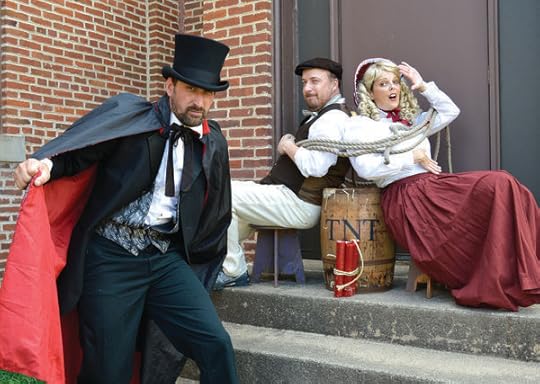
An early reviewer sent me a private note about my latest villain, saying she had no redeeming qualities. I wrote back to agree. I really enjoy writing deep-dyed villains, people we can love to hate. Yes, I admire redeemable villains, too. I’ve read some wonderful stories where the villain in one book learns his or her lesson and is eventually given their own book. And somewhere between the two is a really nasty person who also visits his dear old granny on Sundays and is very fond of his cat, because human beings are complicated. So maybe my villains aren’t as bad as I paint them?
Perhaps I should give the villain in the following excerpt a cat? It’s from To Tame a Wild Rake, and should be self-explanatory. Oh, and, of course, if you have a villain you’d like to share, please add him or her in the comments.
The Beast was in a rage all the more potent for being suppressed as long as he had to be in front of customers. His men had searched all night, but the boy Tony was nowhere to be found, and no one admitted to seeing him.
The searchers brought back many reports about the intruders, and the two whores that had run off with them. They’d taken off on those odd shaped horses the Winshires bred. At first, the Beast had assumed Tony was in the carriage they had with them, but several reports insisted that the escaped females were the only occupants.
It couldn’t be doubted that the boy had gone out the window. The glass was broken and the door was still locked. But if the intruders helped him, why wasn’t he with them?
The guard said he’d not heard the breaking window. The guard was an idiot. He let himself be distracted and overwhelmed by Aldridge—a ton clothes horse, a pretty boy, an overbred mummy’s boy who had never done a lick of work in his life.
Aldridge. The Beast had hated him for two decades, ever since the youthful marquis had come between Wharton—as he was then—and Aldridge’s beautiful little brother. Lord Jonathan Grenford had been a new arrival at Eton, and Wharton’s fag. Wharton had so many plans. They would have been happy together, he just knew it. Gren—it had been Wharton that had given him that name—was a little jumpy, but Wharton was working on him, and he would have been happy in the end. Wharton would have taken care of him.
Then Aldridge had Gren assigned to another senior. Worse. He sent someone—a grown man—to growl threats in the dark, threats reinforced with a dagger to Wharton’s throat. Cowardly bastard.
He’d interfered, too, a decade later, sending his base-born brother to destroy Wharton’s fledging export business. And surely it was not coincidence that the man who cut off the supply of girls for that business was Aldridge’s cousin, another sodding peer.
Here he was again, sticking his nose in where it wasn’t wanted. Wharton had been looking for someone like Tony every since he lost the lovely Gren. The boy was a Grenford get, beyond a doubt, but all the Grenford males were so randy it could have been the father or either of the brothers. Or perhaps just a by-blow from an earlier generation.
Tony either didn’t know, or wasn’t saying.
No matter. He was unacknowledged, which meant the notoriously soft-hearted Aldridge didn’t know about him, which meant the Beast could have him without Aldridge’s interference. It was his reward for twenty years of suffering since Gren was taken from him.
Not the same thing, quite. Tony was a slum brat, not a refined lordling. But good food would put on some weight. Manners could be taught, and the bone structure, the colouring, even the voice, when he aped his betters… it was Gren come again.
The Beast sulked on his throne. He’d refrained from throwing things or screaming at people all night, lest he frighten those whose money was fast replenishing his coffers. Now the edge had gone off his temper, though he was likely to find it again if no one brought him news that allowed him to retrieve his property.
How did Aldridge come to find out about the boy? He came for Tony, the Beast was certain. He may have left with a couple of harlots, but light-heeled girls were ten a penny, and Aldridge was, in any case, too fastidious for brothels. He didn’t come for the girls.
The Winderfield chit, who was harbouring the boy, must have told him. The Beast glared at the stairs to the upper floor, where his sister reigned. This was her fault, too. She had assured him that Aldridge and the Winderfield female were at loggerheads.
He shouldn’t have trusted her, not after last year, when Aldridge’s mother put all her weight as a duchess behind another Winderfield female. Mind you, most of what followed was entirely the fault of the Winderfields, who dared to bring their foreign troops to attack him. And instead of objecting to such a clear breach of the law, that fat freak in Brighton deputed his own troops to support them!
That fiasco had ended with Wharton having to once agchange his name and start again, having lost several lieutenants and a reputation that had taken him years to build. For that, the Winderfields would pay.
Being no fool, the Beast had long ago realised the value of holding his assets and investments under another identity; one that had no connection with activities the law frowned on. Even so, building a new base had taken time, and he’d needed to shelve his plans for those who had opposed him.
No longer. The Winderfields had taken Tony out of the slums, away from the Beast, and then had come into his territory to steal the boyback. The Marquis of Aldridge had dared to invade his home, steal two of his harlots, and at least provide a distraction so Tony could escape. It was time for revenge.







March 15, 2021
Tea with Lady Sutton

“Gracious me,” said Sophia, with an indignant glare at the letter in her lap. “How presumptuous. How impertinent!”
The Duchess of Haverford raised a questioning eyebrow, but her goddaughter was still scowling at the offensive missive and didn’t see.
Eleanor had enjoyed having Sophia and her little daughter to visit while Sophia’s husband, Lord Sutton, was off on some business for his father. Lady Mary Elizabeth was a darling delight; Eleanor would miss her when Sutton arrived to collect them in the morning.
Sophia had folded the letter in half and was tapping it against the arm of her chair, her brows knit in thought.
“Is it something you can tell me about, my dear?” the duchess asked.
Sophia looked up and smiled. “I beg your pardon, Aunt Eleanor. I was so annoyed by this piece of pernicious mischief that I quite forgot where I was. Yes, I would like to tell you about it, if I may.”
“Perhaps another cup of tea?” Eleanor suggested.
Sophia agreed with thanks, and scanned the letter again while Eleanor poured.
“It is from a woman in Fenwick on Sea in Suffolk,” she explained.
“The village where the ship your brother and sister were on took shelter from that dreadful storm,” Eleanor commented.
Sophia nodded, and gave the letter another thunderous frown.
“But Hythe and Felicity found another ship to take them to Belgium, you said,” Eleanor prompted. “What has this woman to say about them that has you so cross?”
“Not them. I mentioned, I think, that Felicity’s maid, Theo, remained in Fenwick. She had been terribly sea sick, and neither Hythe nor Felicity wished to risk her. I am to send a carriage for her as soon as we are back in Gloucestershire.” She smiled. “A slow one. Poor Theo has never travelled well.”
“I remember you left her behind at Hollystone Hall when you raced to London to marry Sutton before his grandfather died,” Eleanor noted.
Another quick smile as Sophia nodded, and then the frown returned. “This woman writes about Theo. Just listen!
‘The designing hussy made her move on the poor curate when the children he has taken in had a mild attack of the ague. Under the guise of nursing them, she took up residence in the village. They say that Mr Somerville also became ill, but since that female would not allow responsible members of the village to see him, we must decide whether this is true, or whether she had no desire for others to interfere in her nefarious attempt to force the man into a proposal by setting up housekeeping with him.’
I must post to Fenwick, and defend our poor dear Theo. James will simply have to take us to Gloucestershire by way of the coast of Suffolk! Rather the long way around, but darling Mary Elizabeth is a good traveller, thank goodness.”
“The curate, you say?” Eleanor asked. “Your sister Felicity mentioned she thought the pair were forming an attachment. Apparently she was right.”
“Yes,” Sophia replied. “And Felicity mentioned this…” she waved the letter… “Mrs Fullerton, too. Apparently the besom has been causing trouble in the parish. Felicity suggested Mr Somerville might be needing another position sooner, rather than later.”
Her smile broadened. “I am looking forward to meeting the man who has prompted my shy, perfectly-behaved maid to such scandal!”

The tempest that batters Barnaby Somerville’s village is the latest but not the least of his challenges.
Vicar to a remote parish, he stretches his tiny stipend to adopt his orphaned niece and nephew and his time to offer medical care as well as spiritual. A wife is a dream he cannot afford.
But the storm sweeps into his life a surprising temptation—a charming young woman who lavishes her gentle care upon his wards—and him.
God knows, he will forever be richer for having known her, even if he must let her go.
Storm & Shelter: A Bluestocking Belles Collection With Friends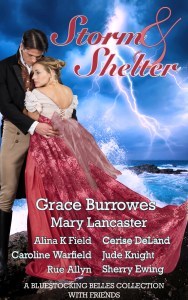 When a storm blows off the North Sea and slams into the village of Fenwick on Sea, the villagers prepare for the inevitable: shipwreck, flood, land slips, and stranded travelers. The Queen’s Barque Inn quickly fills with the injured, the devious, and the lonely—lords, ladies, and simple folk; spies, pirates, and smugglers all trapped together. Intrigue crackles through the village, and passion lights up the hotel.
When a storm blows off the North Sea and slams into the village of Fenwick on Sea, the villagers prepare for the inevitable: shipwreck, flood, land slips, and stranded travelers. The Queen’s Barque Inn quickly fills with the injured, the devious, and the lonely—lords, ladies, and simple folk; spies, pirates, and smugglers all trapped together. Intrigue crackles through the village, and passion lights up the hotel.
One storm, eight authors, eight heartwarming novellas.
Find out more on the Bluestocking Belles’ project page.
Only 99c while on preorder. Published April 13th.







March 13, 2021
Spotlight on Storm & Shelter: Mary Lancaster and Cerise DeLand
Today, I begin a series of posts about the stories in the Bluestocking Belles anthology — or, as you’ll find, Bluestocking Belles and Friends.
Eight authors, eight heartwarming novellas, all set around one storm, and at least in part a single village. Ladies and gentlemen, I give you: Storm & Shelter.
As editor-in-chief, it was my job to suggest an overall order that make sense, and I was fortunate that one was obvious as soon as I finished my first read through. The stories appear in the order of the first appearance of the protagonists in Fenwick on Sea, our fictional village (or the outside protagonist, if one is already a resident).
As it happened, that meant starting with Mary Lancaster’s heroine on board a ship that was fast sinking off our coast. Such a great place to start. And ending with a Grace Burrowes couple finding their unexpected happy ending.
This week, I’m showcasing the first two stories, so read on for blurbs and an excerpt from An Improbable Hero and Lord Stanton’s Shocking Seaside Honeymoon.

A runaway heiress, a mysterious stranger.
When Letty’s ship founders in a violent storm, she forges a rare bond with her rescuer.
Simon is a troubled man on a final, deadly mission—until the spirited yet soothing Letty makes him question everything. Hiding in plain sight among the refugees at The Queen’s Barque, Simon is more than capable of protecting them both. But when the floods recede, can either of them say goodbye?
Excerpt:
The sea heaved around her, carrying her and her companion where it willed.
“What’s your name?” she panted, because they seemed to be tying each other to life.
His head turned in the darkness. There was a distinct, baffled pause. “Simon.”
“Letty.” She even risked sliding her hand across to touch his.
It was as close as they could come to shaking hands. A sound like laughter escaped him, though it might just have been a gulp of breath. “Honored to live or die with you, Letty,” he said.
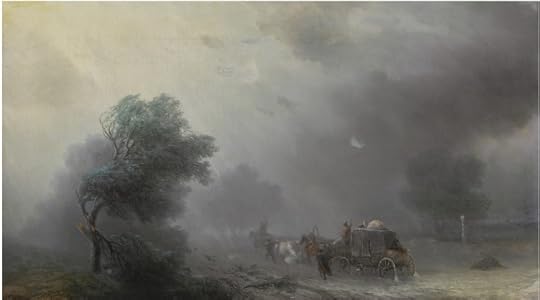
She is so wrong for him.
Miss Josephine Meadows is so young. In love with life. His accountant in his work for Whitehall. Her father’s heir to his trading company—and his espionage network.
Lord Stanton cannot resist marrying her. But to ensure Wellington defeats Napoleon, they must save one of Josephine’s agents.
Far from home, amid a horrific storm, Stanton discovers that his new bride loves him dearly.
Can he truly be so right for her?
And she for him?
Excerpt :
“Stanton is what you want, isn’t he?”
She arched a wicked brow at her father. “Well you know it, too!”
“Indeed. I’ve watched you eye the poor fellow like a starving woman over a tasty treat.”







March 12, 2021
Research in the background
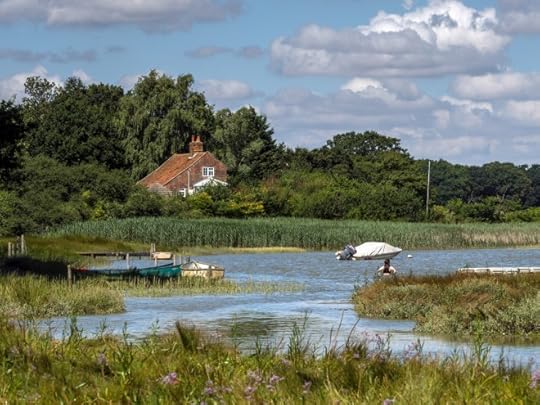
River Alde near Aldeburgh Suffolk, one of the sources for Storm & Shelter’s fictional village of Fenwick on Sea
Research helps me to keep my fictional world contract with my readers. All fiction requires readers to suspend disbelief—to accept the reality of the story while they are reading. The writer’s part of the contract is not to jar the reader out of that disbelief.
Since I write historical fiction, that means creating historical worlds that are a recognisable simulacrum of the setting I’ve used and people of the type I’ve use in that particular place and time. And that means research.
In my Children of the Mountain King series, research took me to Iran in the (European) eighteenth century. The fall of one dynasty and the rise of another became part of the plot. So did the Kopet Dag Mountains north of Iran, and the Silk Road, some arms of which pass through those mountains.
I watched movies, documentaries and YouTube clips to get the feel for those places, and read contempary and more recent books about them.
For the first novel, I also read up on Akhal Teke horses, the modern day descendants of the Turkmen horses that were famous for their endurance, faithfulness, and intelligence. The second took me into medical training in the Middle East and Central Asia, and required a close examination of smallpox symptoms, historical treatment and likely progress.
That second novel comes out in less than a fortnight.
Storm & Shelter, the anthology that comes out next month represented a different kind of challenge. Because all eight of us were writing stories set in the same village, using common characters and settings and the same storm, we needed a common body of research.
The story resource we came up with included:
a list of historical events in the time period of the storiesaccounts of historical floods in the area chosen for our fictional villageimages and descriptions of buildings typical of the area at the time of our settingmaps and floor plans adapted from real world originals and more.All of that needed research. Here, from our story resource, is the fictional setting that resulted.
The village of Fenwick on Sea lies scattered along a road that sprawls along the peninsula between a coastal beach and the river that was once its reason for being. An inlet still remains where the river was, a harbour for the fishing fleet and the occasional ship, blown of course by the irascable North Sea winds. The river itself is long gone, moving like a disgruntled lover to a more favoured town much further north.
The village sprawls across the boundaries that once could barely contain a bustling town, dreaming of past glories. The network of causeways that once criss-crossed the salt marshes has dwindled to a single road from more inland regions. The coastal road turns where once a bridge crossed the faithless river, to skirt the inlet and continue north until it eventually reaches Lowestoft and Great Yarmouth.
Many of the public buildings recall more populous times, not least the Norman church and the Tudor inn, The Queen’s Barque. Most of the cottages of the former town have tumbled to ruin, many now obliterated by the thrift of the surviving villagers, past and present, who have pressed their materials into use. The nucleus of the town comprises the church and its vicarage, the inn and two rows of cottages, one half-timbered with a slate/tile roof and one plastered with a thatched roof. One of the cottages has a general store on the ground floor.
A mere twenty families still eke out an existence fishing, farming, providing goods and services to one another, or all three. Most of the young men have gone to war in the navy or the army. Of those who remain, more than a couple support the local smuggling enterprises alongside their parents and grandparents. The inn also serves as a brewery and a bakery. The village has a farrier and a general store.
The village also serves an even more scattered population of farms that combine crops and livestock, grazing cattle in the marshes and sheep on the sandy heaths. They grow grain, and particularly barley and wheat, but even the high demand for grain caused by the war has not helped to make them prosperous, as the landholdings are small, and distances to market across rough roads make selling their produce hard.
There is a local manor; a minor house of a peer who has many. Neither he nor his family have visited in many years. The house is half a mile from the village, on a knoll between the vanished river and the coast, and is kept in order by a staff comprising a housekeeper and half a dozen servants. The housekeeper regards herself as the highest ranked lady in the district, and the keeper of public morals, and has a cadre of supporters. The innkeeper’s wife forms the nucleus of those who oppose her pretensions. If the vicar had a wife, she would outrank them both, but even so, both ladies are more than willing to help him find one.
See more about:
To Mend the Broken Hearted, released on 23 MarchStorm & Shelter, released on 13 April.






March 9, 2021
Book blurbs in WIP Wednesday

My work in progress is making great progress! I’ve finished taking in the copy edits from the lovely Reina, given it a final proof, and made some changes to the cover. (It now says The Return of the Mountain King as the series title, for one thing.)
I’ve also rewritten the blurb, and that’s my excerpt for today. Next step, finalise the layout files and put them up in the retailers! Launch date is only a fortnight away.
Ruth Winderfield is miserable in London’s ballrooms, where her family’s wealth and questions over her birth make her a target for the unscrupulous and a pariah to the high-sticklers. Trained as a healer, she is happiest in a sickroom. When a smallpox epidemic traps her at the remote manor of a reclusive lord, the last thing she expects is to find her heart’s desire.
Valentine, Earl of Ashbury, was carried home from war three years ago, unconscious, a broken man. He woke to find his family in ruins, his faithless wife and treacherous brother dead, his family’s two girl children exiled to school. He becomes a near recluse while he spends his days trying to restore the estate, or at least prevent further crumbling.
When an impertinent, bossy female turns up with several sick children, including the two girls, he reluctantly gives them shelter. Unable to stand by and watch the suffering, he begins to help with the nursing, while he falls irrevocably for both girls and the lovely Ruth.
The epidemic over, Ruth and Val part ways, each reluctant to share how they feel without a sign from the other. Ruth returns to her family and the ton. Val begins to build a new life centred on his girls. But danger to Ruth is a clarion call Val cannot ignore. If they can stop the villains determined to destroy them, perhaps the hermit and the healer can mend one another’s hearts.







March 7, 2021
Tea with Captain Gilroy

Captain Lord Brandon Gilroy sent his card up to the Duchess of Haverford, and waited with what patience he could muster for Her Grace to decide whether or not to see him.
He needed to know whether his uncle was as well as he claimed in his letters, and the duchess (who, they claimed, knew everything about everyone) almost certainly knew.
Brandon wasn’t free to travel to Scotland to see the Duke of Cowal for himself, not with Napoleon on the loose again. Brandon had thought he was done with French spies and English turncoats, but he needed to leave on the morrow to hunt down yet another plot, this one on the North Sea coast south of Yarmouth.
“Her Grace will see you now,” the footman said, and Brandon followed the man up the elegant staircase and down a long hall.
He’d been here once before, not long after he returned from the voyage that saw him stranded with all his men, his ship taken by a pirate.
The usual feelings of anger and helpless lust swirled in his gut. Irish Red. He’d never known a woman like her. Which was just as well, of course. Who would want to marry a female who dressed as a man, captained a pirate ship, and defeated him in battle.
And why did the word ‘marry’ occur to him. Irish Red wasn’t the sort of woman a person like him married. He let out a short laugh. Nor the sort he bedded either, not if he wanted to leave the bed with all his male equipment.
The footman announced him at the door to the duchess’s private parlour, and Brandon stepped forward and bowed. “Your Grace. Thank you for seeing me.”
“Tea, Captain Gilroy?” Her Grace asked, waving to a tray that stood ready.
Over refreshments, he asked about his uncle. Apparently, according to one of the duchess’s many correspondents, the man was failing. “You should go to him as soon as you can be released from your current duty,” she advised.
Brandon nodded, wondering what Her Grace knew about his current duty. Far more than any civilian should, he had no doubt. Her next words hit him like a brick. “You will need to marry once you inherit, Captain Gilroy. Have you any thoughts about a wife?” Images of Irish Red flooded his mind. Ridiculous. He shook them off.
“Time enough for that when we’ve defeated Napoleon again, Your Grace,” he insisted.

Brandon will meet Irish Red again sooner than he expects, in Rue Allyn’s novel Wait For Me, which you’ll find in Storm & Shelter. Buy links at https://books2read.com/u/b5k2pO
Wait for Me: Rue AllynEnemies by nature—Esmeralda Crobbin, aka the pirate Irish Red, and Captain, Lord Brandon Gilroy have met before.
Fate trumps nature—When a fierce storm creates a chance encounter and forced proximity, Brandon learns the pirate is a woman of serious honor and responsibility. Esmeralda discovers the captain is more than a uniform stuffed with rules and regulations. Both love the sea with boundless passion, but can they love each other?
Storm & Shelter: A Bluestocking Belles Collection With Friends When a storm blows off the North Sea and slams into the village of Fenwick on Sea, the villagers prepare for the inevitable: shipwreck, flood, land slips, and stranded travelers. The Queen’s Barque Inn quickly fills with the injured, the devious, and the lonely—lords, ladies, and simple folk; spies, pirates, and smugglers all trapped together. Intrigue crackles through the village, and passion lights up the hotel.
When a storm blows off the North Sea and slams into the village of Fenwick on Sea, the villagers prepare for the inevitable: shipwreck, flood, land slips, and stranded travelers. The Queen’s Barque Inn quickly fills with the injured, the devious, and the lonely—lords, ladies, and simple folk; spies, pirates, and smugglers all trapped together. Intrigue crackles through the village, and passion lights up the hotel.
One storm, eight authors, eight heartwarming novellas.
Find out more on the Bluestocking Belles’ project page.
Only 99c while on preorder. Published April 13th.







March 6, 2021
Spotlight on To Mend the Broken-Hearted

Novel 2 in the Mountain King series is on preorder, and will be published on 23 March, in just 16 days. My copy editor calls it ‘a wonderful, emotional, engaging read’. Two of the beta readers said it is the best yet. I can’t wait to find out what you think! If you’re on my ARC team, expect an email in the next four days letting you know it’s ready. If you’re not, you can preorder To Mend the Broken Hearted here.
To Mend the Broken-HeartedRuth Winderfield is miserable in London’s ballrooms, where the wealth of her family and the question over her birth make her a target for the unscrupulous and a pariah to the high-sticklers. Trained as a healer, she is happiest in a sickroom. When she’s caught up in a smallpox epidemic and finds herself quarantined at the remote manor of a reclusive lord, the last thing she expects is to find her heart’s desire. A pity he does not feel the same.
Valentine, Earl of Ashbury, hasn’t seen his daughter—if she is his daughter—in three years. She and her cousin, his niece, remind him of his faithless wife and treacherous brother, whose deaths three years ago will never set him free. Val spends his days trying to restore the estate, or at least prevent further crumbling. When an impertinent bossy female turns up with several sick children, including the girls he is responsible for, he reluctantly gives them shelter. Even more reluctantly, he helps with the nursing. The sooner they leave again the better, even if Ruth has wormed her way into his heart. She is better off without him.
Danger to Ruth brings him out of seclusion, and into a future he had not been able to imagine.
And here is an early meeting between themSomething out of place alerted the sentinel in Ruth’s brain developed when she and Zyba had been in the guard squads assigned by her father to escort caravans through bandit country in the mountains and deserts of her homeland. Simpler days, those, with the enemies hidden behind rocks rather than smiles and lies.
There it was again. A metallic scrape. Silently, she uncurled from her chair, reaching through the slit in her skirt for the dagger in the sheath strapped to her thigh. Against the grey of the night, a blacker shape climbed onto the window sill, pausing there to whisper. “Lady Ruth?”
Assassins do not usually announce themselves. She could probably acquit the intruder of malicious intent, which meant he was more in danger from the illness than she and her charges where from him.
“Go away,” she told him. “This room is in quarantine. We have four cases of smallpox.”
The man moved, coming fully into the room so she could see hints of detail in the far reaches of the candle light. He was tall, with broad shoulders. A determined chin caught the light as he pulled something from his pocket and sat on a chair by the window. The light also glinted off a head of close-cut fair hair. Lord Ashbury.
“I am aware. Four patients, one of them my responsibility. One exhausted doctor. You need help.” As he spoke, he lifted one bare foot after the other, rolling a stocking on each and then tucking the long elegant foot into a soft indoor shoe taken from his pocket. He was deft with his single hand.
“I don’t need more patients,” Ruth objected, less forcefully than she might if he had not moved closer so that the light touched half of his face, making the rest seem darker by contrast. Dark eyes glinted in the shadows cast by firmly arched brows. His gaze was intent on hers.
“I have had the smallpox, my lady, and I am not leaving, so you might as well make use of me. I’m no doctor, but I can follow instructions. You need sleep if you’re to avoid illness yourself.”
Her tired brain caught up with the comment about his responsibility. “You cannot think to nurse the girls.”
“What prevents me?” Ashbury demanded. “My amputation? I have one more hand than you can muster on your own. Their modesty? You and the maids can manage their bathing and other personal matters. I can free you up to look after them in that way by lifting and carrying for you. My dignity? I work my own fields, my lady. I am not too exalted to fetch and carry for the woman who intends to save my niece’s life.”
Ruth turned, then, and looked straight at him, and he moved so the lamp shone directly on his face. “You are not qualified,” she told him.
Ashbury shrugged. “True. I daresay half the world is better qualified than I. But I have done some battlefield nursing and I am here.”
“You cannot stay. I am an unmarried woman. You are a man.” A ridiculous statement. Here, isolated from the foolish scandal-loving world of the ton, who was to know? Besides, she would never put something as ephemeral as ‘reputation’ ahead of the needs of her patients.
He took another meaning from her objection, spreading his remaining hand to show it empty, and saying gravely. “I will do you no harm. I give you my word.”
Of course, he wouldn’t. Even if he were so inclined, he would not get close enough to try. Something of her thought must have shown in her face, because one corner of his mouth kicked up.
“I suppose you are a warrior after the fashion of that fierce maiden you have guarding the quarantine. You are three-times safe then, my lady, with my honour backed by your prowess and reinforced by the knowledge that any missteps on my part will anger your champions.”
Her spurt of irritation was prompted by Lord Ashbury’s amusement, not by the unexpected physical effect of his desert anchorite’s face lightened by that flash of humour. “I was more concerned about the impact on our lives if it is known we’ve been effectively unchaperoned for perhaps several weeks.”
He raised his brows at that and the amusement disappeared. “My servants are discreet and yours would die for you. Besides, you have your maid with you at all times, do you not? And I have my—” he hesitated over a word; “my charges,” he finished.
His niece and his daughter, Ruth thought, wondering what story explained his reluctance to say the words. No matter. He was determined. He was also right; she needed someone else to share the nursing, and now she had a volunteer. Her attraction to him was undoubtedly amplified by her tiredness. She would ignore it, and it would go away.
At the realisation she could finally hand her watch over to someone else, her exhaustion crashed in on her, and it was all she could do to draw herself together and say, “Come. I will show you what you need to do, and explain what to watch for.”







March 4, 2021
Horses for hire
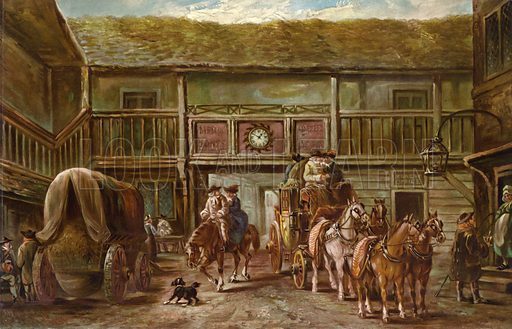
Land travel in Regency England required negotiating rough roads and weather on foot, or on an animal or a vehicle pulled by an animal. Anyone with the money could purchase a seat on a stage coach, or even the mail coach if speed was more important than comfort.
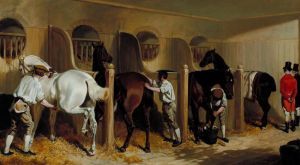 More money would get you a post chaise – a hired carriage that took you from the inn where you hired it as far as the owning company agreed to go. With your post chaise, you also got one or more post riders who worked for the owning company, who rode the horses or maybe alongside the horses, and took the post chaise back when you’d finished it.
More money would get you a post chaise – a hired carriage that took you from the inn where you hired it as far as the owning company agreed to go. With your post chaise, you also got one or more post riders who worked for the owning company, who rode the horses or maybe alongside the horses, and took the post chaise back when you’d finished it.
Wealthy travelers preferred the convenience of their own carriage. Not only were private carriages likely to be better sprung and better fitted out with every convenience, but on a long trip the travelers wouldn’t have to change carriages when reaching the boundaries of a hire company’s territory.
With all three types of traveler on the road, a staggering number of horses were needed to keep them moving. Each team could manage perhaps 10 or 15 miles before tiring, depending on terrain and conditions, and then the carriage would need to stop and have the team replaced with a fresh one.
At the height of the period, an inn on a popular route might have up to 2,000 horses available for hire, or being boarded on behalf of wealthy travell\ers who preferred their own horses and could afford to send them on ahead for a planned journey.

In Storm & Shelter, floods and slips force many travelers to interrupt their travel at the coaching inn in Fenwick on Sea. Storm & Shelter is the latest anthology of novellas from the Bluestocking Belles, this time with novellas from friends Grace Burrowes, Mary Lancaster, Alina K. Field. It is 99c until publication on 13 April.







March 2, 2021
Internal dialogue on WIP Wednesday
[image error]
It’s nice to give a character a friend to talk to, so readers can find out what they’re thinking. But now and again, we need to peek inside their heads. In today’s post, I’m including some thoughts that my character Aldridge would never share with anyone else. If you have an excerpt with internal dialogue that you’d like share, please feel free to add it to the comments.
Aldridge let himself into the Duke’s Study. The duke’s desk, a massive object of carved oak, stood in the bay window, its back to the view out over the pleasure gardens that descended from the house to the river.
Aldridge had thought of taking it over; of moving it so it was at right angles to the windows so that he could enjoy the view while he was working.
He would certainly enjoy the extra space. His own cadet desk, tucked away in a corner near the door, was a quarter of the size. And, as each secretary in turn had pointed out, his father would never return to this room or even to London, and Aldridge was duke in all but name, rank, and title.
It was a final step he wasn’t willing to take until he had to. He would adopt his father’s desk when he took his father’s title. Refusing the first was, he knew, a symptom of his reluctance to assume the second. If the doctors were to be trusted, he’d be the Duke of Haverford within the next twelve months, and probably sooner rather than later.
None of his secretaries or clerks understood. They thought he was lucky. But then, they and the rest of the population of England thought he was the Merry Marquis; envied him his wealth, his position, the hordes of women keen on an illicit relationship, even the maidens panting for a chance to be his duchess.
The reasons people wanted him had nothing to do with him. He could be a donkey on two legs, and they’d still praise him. The woman would still pant to bed him. The men would still court his favour. And if it was bad now, how much worse would it be when he was duke?
He was a title and a position, not a man. Even those who knew him best couldn’t see past the marquis, the heir. Just a clever automaton, smartly dressed, with a repertoire of motions and words to fool people into thinking he was a real person. On days like today, when he had given the one lady he wanted to attract yet another reason to despise him, when he’d been unable even to protect a boy who apparently bore his blood, he wondered if they were right.
He gave a short laugh. How the rest of the world would mock and marvel to know he was feeling sorry for himself.










